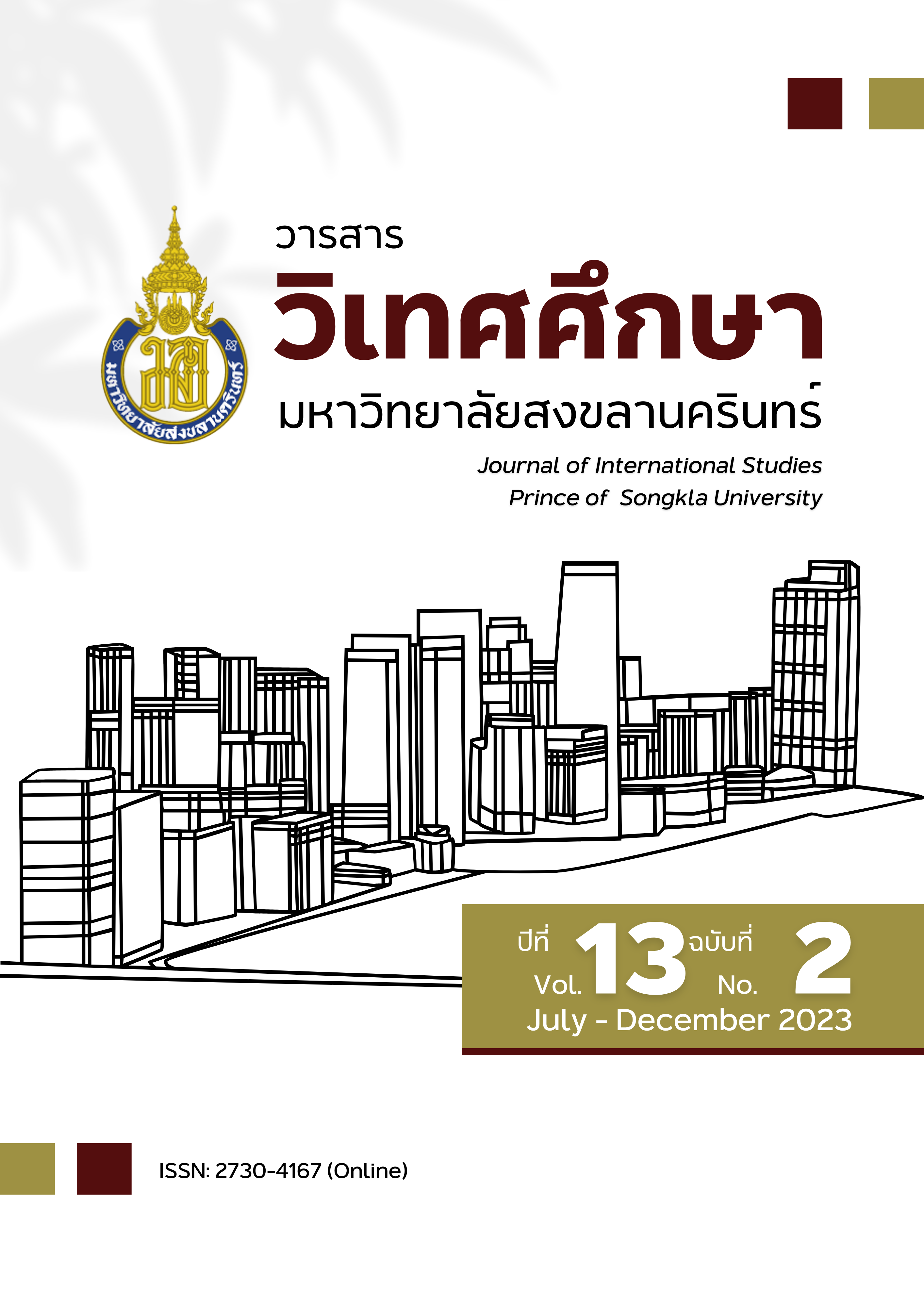แนวทางการพัฒนาแอปพลิเคชันจองที่พักออนไลน์ของธุรกิจโรงแรมและที่พัก
Main Article Content
บทคัดย่อ
งานวิจัยนี้มีวัตถุประสงค์เพื่อ 1) ศึกษาระดับความสำคัญของปัจจัยภูมิทัศน์บริการของแอปพลิเคชันบนโทรศัพท์เคลื่อนที่ในการจองที่พักออนไลน์ 2) วิเคราะห์ปัจจัยภูมิทัศน์บริการของแอปพลิเคชันบนโทรศัพท์เคลื่อนที่ที่มีอิทธิพลต่อความไว้วางใจในการเลือกใช้แอปพลิเคชันบนโทรศัพท์เคลื่อนที่จองที่พักออนไลน์ และ 3) ศึกษาความสัมพันธ์ระหว่างความไว้วางใจและความพึงพอใจแอปพลิเคชันบนโทรศัพท์เคลื่อนที่ ใช้แบบสอบถามในการเก็บข้อมูลจากนักท่องเที่ยวชาวไทยในจังหวัดชลบุรี ด้วยวิธีการสุ่มตัวอย่างแบบเจาะจง ได้ข้อมูลที่เหมาะสมจำนวน 398 ชุด สถิติที่ใช้ในการวิเคราะห์ คือ สถิติค่าที การวิเคราะห์ความแปรปรวนทางเดียว การวิเคราะห์การถดถอยเชิงพหุคูณ และการวิเคราะห์ การถดถอยอย่างง่าย ผลการวิจัยพบว่า ปัจจัยของภูมิทัศน์บริการของแอปพลิเคชันบนโทรศัพท์เคลื่อนที่ในการจองที่พักออนไลน์ ด้านการจัดวางและอรรถประโยชน์ของพื้นที่ มีค่าเฉลี่ยความสำคัญสูงสุด และอายุ การศึกษา อาชีพ รายได้ และความถี่ในการใช้ ส่งผลต่อความสำคัญของปัจจัยภูมิทัศน์บริการและมีความแตกต่างกันระหว่างกลุ่ม ขณะที่ปัจจัยด้านการจัดวางและอรรถประโยชน์ของพื้นที่ และด้านความเป็นส่วนตัวและปลอดภัย มีอิทธิพลเชิงบวกต่อความไว้วางใจ และความไว้วางใจมีอิทธิพลเชิงบวกต่อความพึงพอใจอย่างมีนัยสำคัญทางสถิติ
Article Details

อนุญาตภายใต้เงื่อนไข Creative Commons Attribution-NonCommercial-NoDerivatives 4.0 International License.
ข้อความและความคิดเห็นที่แสดงในบทความ เป็นแนวคิดของผู้เขียน มิใช่ความรับผิดชอบของกองบรรณาธิการ และคณะผู้จัดทำแต่อย่างใด
บทความ ข้อมูล เนื้อหา รูปภาพ ฯลฯ ที่ได้รับการตีพิมพ์ในวารสารวิเทศศึกษา ถือเป็นลิขสิทธิ์ของวารสารวิเทศศึกษา หากบุคคลหรือหน่วยงานใดต้องการนำทั้งหมดหรือส่วนหนึ่งส่วนใดไปเผยแพร่ต่อหรือเพื่อกระทำการใด ๆ จะต้องได้รับอนุญาตเป็นลายลักษณ์อักษรจากวารสารวิเทศศึกษา ก่อนเท่านั้น
เอกสารอ้างอิง
กนกวรรณ รัตนปรีชาชัย และ จรัญญา ปานเจริญ. (2565). ความไว้วางใจที่มีผลต่อความจงรักภักดีในการซื้อสินค้าออนไลน์ของผู้บริโภคในกรุงเทพมหานครและปริมณฑล. วารสารสุทธิปริทัศน์, 35(4), 25-41.
นิติยา มหาชานิกะ. (2559). ปัจจัยที่มีผลต่อพฤติกรรมการจองโรงแรมผ่านระบบออนไลน์ กรณีศึกษา: เว็บไซต์อโกด้า. วารสารสมาคมสถาบันอุดมศึกษาเอกชนแห่งประเทศไทย, 22(1), 110-118.
พรไพลิน จุลพันธ์. (2565, 3 กุมภาพันธ์). แพลตฟอร์มทำรายได้ให้กับโรงแรมสูงสุดในไทยปี 64. กรุงเทพธุรกิจออนไลน์. https://www.bangkokbiznews.com/business/985970
พุทธชาด ลุนคำ. (2564, 24 กุมภาพันธ์). แนวโน้มธุรกิจ/อุตสาหกรรม ปี 2562-2564: ธุรกิจโรงแรม. วิจัยกรุงศรี.
https://www.krungsri.com/th/research/industry/industry-outlook/Services/Hotels/IO/io-hotel-21
ภคินี วัชรปรีดา, จินดา งามสุทธิ, และจุลสุชดา ศิริสม. (2556). ผลกระทบของภูมิทัศน์การบริการที่มีต่อการตอบสนองทางอารมณ์และการรับรู้คุณภาพการบริการของลูกค้าชาวต่างชาติที่ใช้บริการโรงแรมประเภทบูทีค ในเขตพื้นอำเภอเมือง จังหวัดเชียงใหม่. วารสารมหาวิทยาลัยนครพนม, 3(2), 108-114.
ศิริพล แสนบุญส่ง. (2559). การพัฒนาเว็บไซต์คณะครุศาสตร์ มหาวิทยาลัยราชภัฏพระนครศรีอยุธยา ด้วยระบบบริหารจัดการเนื้อหาบนเว็บไซต์. วารสารบัณฑิตศึกษา มหาวิทยาลัยราชภัฏวไลยอลงกรณ์ ในพระบรมราชูปถัมภ์, 10 (2), 117-128.
สราลี โรมรัตนพันธ์. (2562). ความไว้วางใจ คุณภาพการให้บริการ การรับรู้คุณค่า และภาพลักษณ์ส่งผลต่อความพึงพอใจ และการกลับมาใช้บริการซ้ำของสายการบินต้นทุนต่ำภายในประเทศ [วิทยานิพนธ์ปริญญามหาบัณฑิต, มหาวิทยาลัยกรุงเทพ]. http://dspace.bu.ac.th/bitstream/123456789/3993/1/saralee_romr.pdf
อรดา รัชตานนท์, กชพรรณ สัลเลขนันท์, โชติพัฒน์ กลิ่นสุคนธ์, จิรวัฒน์ ภู่งาม, และมณฑล ศิริธนะ. (2563). ผลกระทบจากธุรกิจ e-commerce ต่อผู้ประกอบการท้องถิ่น. ธนาคารแห่งประเทศไทย.
Alias, Z., & Abdullah, M. (2017). Addressing demographic differences in servicescape influence among department stores’ patrons in Malaysia. Journal of International Business, Economics and Entrepreneurship, 2(1), 23-33. https://doi.org/10.24191/jibe.v2i1.14458
Amin, M., Rezaei, S., & Abolghasemi, M. (2014). User satisfaction with mobile websites: The impact of perceived usefulness (PU), perceived ease of use (PEOU) and trust. Nankai Business Review International. 5(3), 258-274. https://doi.org/10.1108/NBRI-01-2014-0005
Aprianti, R., & Rachmawati, I. (2020). The effect of e-servicescape dimensions on repurchase intention with trust as an intervening variable. Almana : Jurnal Manajemen dan Bisnis, 4(3), 309-315. https://doi.org/10.36555/almana.v4i3.1339
Batista-Sanchez, E., Deegan, J., & Perez-Ricardo, E. (2022). Influence of internet on tourism consumer behaviour: A systematic review. Advances in Hospitality and Tourism Research (AHTR), 10(1), 130-156. https://doi.org/10.30519/ahtr.917210
Berry, L. L., Parasuraman, A., & Zeithaml, V. A. (1994). Improving service quality in America: Lessons learned. Academy of Management Perspectives, 8(2), 32-45. https://doi.org/10.5465/ame.1994.9503101072
Beyari, H. (2020). The role of trust and its impacts on consumer satisfaction in the context of social commerce. Journal for Research on Business and Social Science (ISSN (Online) 2209-7880), 3(9).
Chang, H. J., Eckman, M., & Yan, R. N. (2011). Application of the stimulus-organism-response model to the retail environment: The role of hedonic motivation in impulse buying behavior. The International review of retail, distribution, and consumer research, 21(3), 233-249. https://doi.org/10.1080/09593969.2011.578798
Dulloo, R. (2018). Impact of demographic factors on consumers trust towards mobile shopping apps. Journal of Advanced Research in Dynamical and Control Systems, 10(7), 926-940.
Everard, A., & Galletta, D. F. (2005). How presentation flaws affect perceived site quality, trust, and intention to purchase from an online store. Journal of management information systems, 22(3), 56-95. https://doi.org/10.2753/MIS0742-1222220303
Fang, Y., Qureshi, I., Sun, H., McCole, P., Ramsey, E., & Lim, K. H. (2014). Trust, satisfaction, and online repurchase intention. Mis Quarterly, 38(2), 407-428.
Ferrera, O. (2015). The customers’ perception of servicescape’s influence on their behaviours, in the food retail industry [Doctoral dissertation, Dublin Business School]. https://esource.dbs.ie/handle/10788/2328
Fitzsimmons, J., & Fitzsimmons, M. J. (2006). Service management. Tata McGraw Hill Education Private Limited.
George, J. F., Mirsadikov, A., & Mennecke, B. E. (2016). Website credibility assessment: An empirical-investigation of prominence-interpretation theory. AIS Transactions on Human-Computer Interaction, 8(2), 40-57.
Guido, G. (2015). Customer satisfaction. Wiley encyclopedia of management, 9, 1-8. https://doi.org/10.1002/9781118785317.weom090287
Hair, J. F., Black, W. C., Babin, B. J., & Anderson, R. E. (2010). Multivariate data analysis: A global perspective. (7th ed.). Pearson Education Inc.
Harris, L. C., & Goode, M. M. (2010). Online servicescapes, trust, and purchase intentions. Journal of Services Marketing, 24(3), 230-243. https://doi.org/10.1108/08876041011040631
Johannes, V. D., Indarini, I., & Margaretha, S. (2018). Usability, customer satisfaction, service, and trust towards mobile banking user loyalty. Proceeding of Advances in Social Science, Education and Humanities Research, 186, 144-147. http://repository.ubaya.ac.id/id/eprint/34730
Mohd-Sam, M. F., & Tahir, M. N. H. (2009). Website quality and consumer online purchase intention of air ticket. International Journal of Basic & Applied Sciences, 9(10), 20-25.
Napitupulu, T. A., & Aditomo, H. C. (2015). Factors affecting customer loyalty in business e-commerce: A case of Indonesia. Journal of Theoretical & Applied Information Technology, 76(3), 386-392.
Nunnally, J. C., & Bernstein, I. H. (1994). Psychometric theory (3rd ed.). McGraw-Hill.
Octavia, D., & Tamerlane, A. (2017). The influence of website quality on online purchase intentions on agoda.com with e-trust as a mediator. Binus Business Review, 8(1), 9-14. https://doi.org/10.21512/bbr.v8i1.1680
Ponte, E. B., Carvajal-Trujillo, E., & Escobar-Rodríguez, T. (2015). Influence of trust and perceived value on the intention to purchase travel online: Integrating the effects of assurance on trust antecedents. Tourism management, 47, 286-302. https://doi.org/10.1016/j.tourman.2014.10.009
Rico, M. T., Wahyoedi, S., & Purnama, E. D. (2019). The effects of trust, service quality and perceived value on satisfaction and their impact on loyalty. In P. Aryasih, & N. Mahadewi (Eds.), The 7th International Conference on Entrepreneurship and Business Management (pp. 325-330). http://dx.doi.org/10.13140/RG.2.2.12641.35680
Rong, J., Vu, H. Q., Law, R., & Li, G. (2012). A behavioral analysis of web sharers and browsers in Hong Kong using targeted association rule mining. Tourism Management, 33(4), 731-740. https://doi.org/10.1016/j.tourman.2011.08.006
Schoorman, F. D., Mayer, R. C., & Davis, J. H. (2007). An integrative model of organizational trust: Past, present, and future. Academy of Management review, 32(2), 344-354. https://doi.org/10.5465/amr.2007.24348410
Sharma, G., & Lijuan, W. (2015). The effects of online service quality of e-commerce websites on user satisfaction. The electronic library, 33(3), 468-485. https://doi.org/10.1108/EL-10-2013-0193
Somodi, L. (2021, May 5). The best distribution channels in travel and tourism. Orioly. https://www.orioly.com/best-distribution-channels-travel-tourism/
Triyuni, N. N., Leo, G., & Suhartanto, D. (2021). Online food delivery service. Proceedings of the 2nd International Seminar of Science and Applied Technology, 207, 697-702. https://www.atlantis-press.com/article/125963725.pdf
Wilson, A., Zeithaml, V. A., Bitner, M. J., & Gremler, D. D. (2016). Services marketing: Integrating customer focus across the firm. McGraw Hill.
Yamane, T. (1967). Statistics: An introductory analysis (2nd ed.). Harper and Row.


